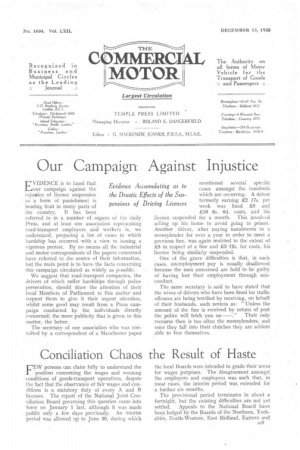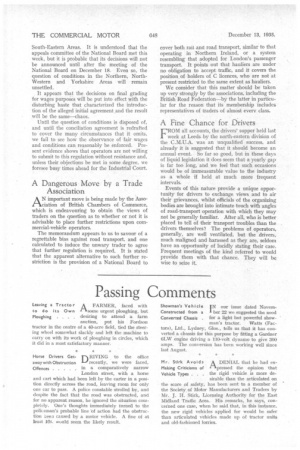Conciliation Chaos the Result of Haste
Page 35

Page 36

If you've noticed an error in this article please click here to report it so we can fix it.
FEW persons can claim fully to understand the position concerning the wages and working conditions of goods-transport operatives, despite the fact that the observance of fair wages and conditions is a statutory duty of every A and B licensee. The report of the National Joint Conciliation Board governing this question came into force on January 1 last, although it was made public only a few days previously. An interim period was allowed up to June 30, during which the local Boards were intended to grade their areas for wages purposes. The disagreement amongst the employers and employees was such that, in most cases, the interim period was extended for 'a further six months., The provisional period terminates in about a fortnight, but the existing difficulties are not yet settled. Appeals to the National Board have been lodged by the Boards of the Northern, Yorkshire, North-Western, East Midland', EaStern and South-Eastern Areas. It is understood that the appeals committee of the National Board met this week, but it is probable that its decisions will not be announced until after the meeting of the National Board on December 18. Even so, the question of conditions in the Northern, NorthWestern and Yorkshire Areas will remain unsettled.
. It appears that the decisions on final grading for wages purposes will be put into effect with the disturbing haste that characterized the introduction of the alleged initial agreement and the result will be the same—chaos.
Until the question of conditions is disposed of, and until the conciliation agreement is redrafted to cover the many circumstances that it omits, we fail to see how the observance of fair wages and conditions can reasonably be enforced. Present evidence shows that operators are not willing to submit to this regulation without resistance and, unless their objections be met in some degree, we foresee busy times ahead for the Industrial Court.
A Dangerous Move by a Trade Association
AN important move is being made by the Association of British Chambers of Commerce, which is endeavouring to obtain the views of traders on the question as to whether or not it is advisable to place further restrictions upon commercial-vehicle operators.
The memorandum appears to us to savour of a regrettable bias against road transport, and one calculated to induce the unwary trader to agree that further regulation is required. It is stated that the apparent alternative to such further restriction is the provision of a National Board to cover both rail and road transport, similar to that operating in Northern Ireland, or a system resembling that adopted for London's passenger transport. It points out that hauliers are under no obligation to accept traffic, and it covers the position of holders of C licences, who are not at present restricted to the same extent as hauliers.
We consider that this matter should be taken up very strongly by the associations, including the British Road Federation—by the latter in particular for the reason that its membership includes representatives of traders of almost every class.
A Fine Chance. for Drivers FROM all accounts, the drivers' supper held last week at Leeds by the north-eastern division of the C.M.U.A. was an unqualified success, and already it is suggested that it should become an annual event. So far so good, but in these days of liquid legislation it does seem that a yearly gap is far too long, and we feel that such occasions would be of immeasurable value to the industry as a whole if held at much more frequent intervals.
Events of this nature provide a unique opportunity for drivers to exchange views and to air their grievances, whilst officials of the organizing bodies are brought into intimate touch with angles of road-transport operation with which they may not be generally familiar. After all, who is better placed to tell of their transport troubles than the drivers themselves? The problems of operators, generally, are well ventilated, but the drivers, much maligned and harassed as they are, seldom have an opportunity of lucidly stating their ease. Frequent meetings of the kind referred to would provide them with that chance. They will be wise to seize it.




































































































